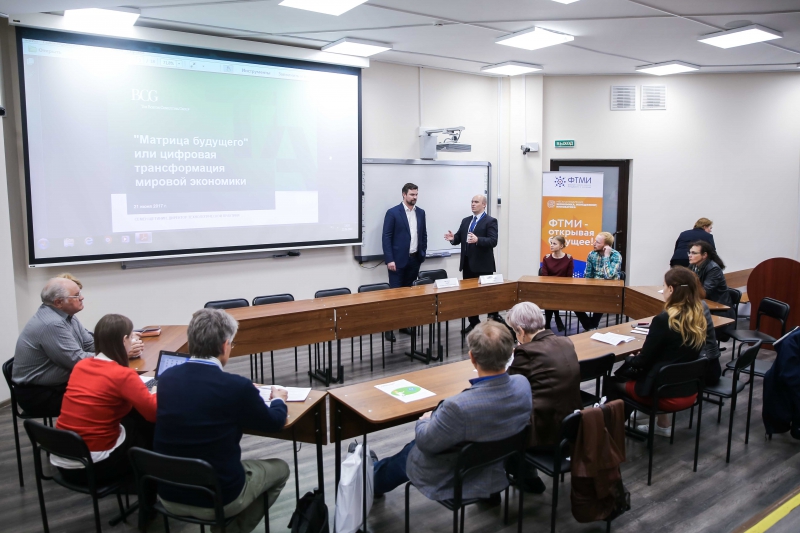The Week of Information Society Technologies began on Thursday, June 21 and will go on for three days, during which a number of scientific conferences, international seminars and lectures will be held. It is organized by ITMO University with cooperation from the Higher School of Economics (HSE), St. Petersburg State University and the Library of the Russian Academy of Sciences. As noted by Andrey Chugunov, academic secretary of IMS Conference and convenor of DTGS Conference, this is the first time that the event is held in such a format, although it has almost twenty years of history behind it: the Week’s key event – the 20th National Conference – has been held annually in St. Petersburg since 1998.
The Week has both Russian and international parts. On June 21, the Second International Scientific Conference “Digital Transformations & Global Society” was launched at ITMO University. It is dedicated to the current development trends in information society – research in social informatics, sociology and culturology of cyberspace, digital evolution of urban environment, theory and practice of “smart cities” construction, transformation of entrepreneurship and workflow in the digital environment and many others.
Among the event’s key speakers are Dr. Gianluca Demartini from the University of Sheffield, UK, Alexander Boukhanovsky, Director of ITMO’s School of Translational Information Technologies, Daniil Alexandrov, Dean of St. Petersburg School of Social Sciences and Humanities at HSE, Dr. King-Wa Fu from the University of Hong Kong, Prof. Carlos Gershenson from the National Autonomous University of Mexico and others.

Semyon Schetinin
The opening day of the Week of Information Society Technologies was marked by a lecture by Semyon Schetinin, head of the Russian office of the Boston Consulting Group (BCG). BCG is one of the world’s top management consulting companies. Its founder, Bruce Henderson, it also known as the author of one of the most widely used business management tools – the BCG growth-share matrix.
Effect of digitalization on regular business models
The regular telephone took about 75 years to gain the status of a household item. The cell phone took about a quarter of that time to do the same – approximately 16 years, says BCG. Facebook, WhatsApp and Instagram garnered millions of users from all over the world in even less time – only two to four years. These days the speed at which new services ingrain themselves in people’s lives is measured in days – just look at the popularity of Prisma or last year’s Pokemon Go fad. In the modern digital world, every minute a new 2664 smartphones are made, more than 130 thousand apps are downloaded and more than 760 thousand photos are shared through WhatsApp, notes Mr. Schetinin. But does the breakneck speed of technological development make the digitalization process truly global?
“It’s important to understand that digitalization needs to be put in a broad perspective,” – explains the BCG expert – “A technology by itself is pointless; it may or may not be utilized. It is just a way of actualizing something else. As we see it, that something is a business task with a technological aspect and data usage. These three components – technology, business task and data – come together to create added value in digital economy.”

The emergence of new technologies can transform whole industries and force even the major players to restructure their regular business models. For example, Uber affected the taxi industry, changed the customer interaction model and left dozens of local businesses in the dust, pushing out even the long-established leaders. Or, for instance, the Kodak company that, at some point, decided not to pursuit digital technology, was, in the end, pushed out by Canon and Nikon.
How can one avoid the fate of becoming an outsider and make a timely decision to digitalize a company’s activity? There are several solutions that BCG considers viable. The first is to identify and create new digital business models. The second entails full digitalization of a company’s operating model. In this case a company would not only need to reduce expenses and optimize its processes, but also fully transfer its value creation chain onto a digital platform and fully renew its IT architecture. And, finally, the third option is to create a completely new business or industry, which is exactly what venture capital aims to do, explains Mr. Schetinin. In that case, new technology is used as basis for breakthrough innovations.
Russia’s potential in global digital economy
On a regular basis, BCG conducts research to determine the rate of integration of digital technologies into the national economies of the world’s countries. The most recent in-depth analysis of Russia (BCG’s “Russia Online” study) was done last year.
“To sum it up, so far Russia is behind the leaders in regards to the digital contribution to its GDP. Its value in this criterion is 2,1%, as opposed to, say, the UK’s 8%” – explains Semyon Schetinin.
Yet, the company notes, Russia has great opportunities for growth. According to a forecast, if the Russian government assumes an “Asian” policy of not only focusing on the basics (infrastructure, online expenses and embeddedness), but also boosting investments from the private and government sector into innovative areas (Internet of Things, Big Data, development of IT products and services with a high export potential), its digital share of economy could reach a value of 5.6% (as compared to the expected European average of 7.5% by 2020).

Mr. Schetinin adds that now more than ever the government needs to construct a development model for digital economy that deals with regulatory, infrastructural and training aspects of this area.
“One of the key elements for a digital economy is the presence of competencies. New ones are needed. We identify 10 main categories of competencies that are in demand in the field of digital economy,” – he adds.
Among these categories outlined by BCG are: Big Data and advanced analytics; Agile expertise; digital content; mobile interfaces; digital user experience; risks and security; digital payments; digital branding and advertising; traditional software and infrastructure. Besides these technical competencies, there is also a need for highly qualified managers who, posessing basic knowledge of all these areas, would be able to successfully manage the new teams.
Despite the current lack of such experts on the market, it is the area of “digital human resources” that Russia undoubtedly has an advantage in, adds Mr. Schetinin. The country has always been known for its technical experts, which is why Russia already possesses a technical platform from which it can launch its digital economy.
“Digital talents”
Another thing the government has to do is to cultivate “digital talents” (that is how BCG calls this category of experts) and motivate them to stay in the country. Still, companies themselves need to begin developing a completely new approach to working with these specialists.
“Digital transformation creates a lot of space for applying one’s abilities; it expands their range of activities and impresses its own specific aspects onto the young generation. What we can quite clearly see on the job market for “digital talents” is that their motivation factors are very different from what we’re used to. Conservative companies find it hard to find, employ and keep such workers,” – emphasizes the BCG expert.

For example: if, in the usual cases, the main driving factor for employees is money, the “digital generation” cares much less about financial gain. They place more emphasis on how interesting their tasks might be and the amount of risk they might face in their work process, claim BCG experts. In addition, modern specialists are more interested in developing “horizontally” – they strive not to build a career in a specific field, but instead try their hand at various fields. As Mr. Schetinin notes, according to the company’s analysts, today’s IT specialists work in a position for approximately two years. After that, they find themselves ready to leave for a different company; their main motivation is the accumulation of experience and finding new and exciting tasks.
Other notable factors driving the “digital talents” are a need to see the end product of their work and the need for a periodical recognition of their efforts, adds the expert.
“In a way, these days employers have it harder than job-seekers. But companies that are set on following the path of digitalization are already beginning to adapt to this environment and create the right conditions for the new generation of workers,” concludes Semyon Schetinin.






